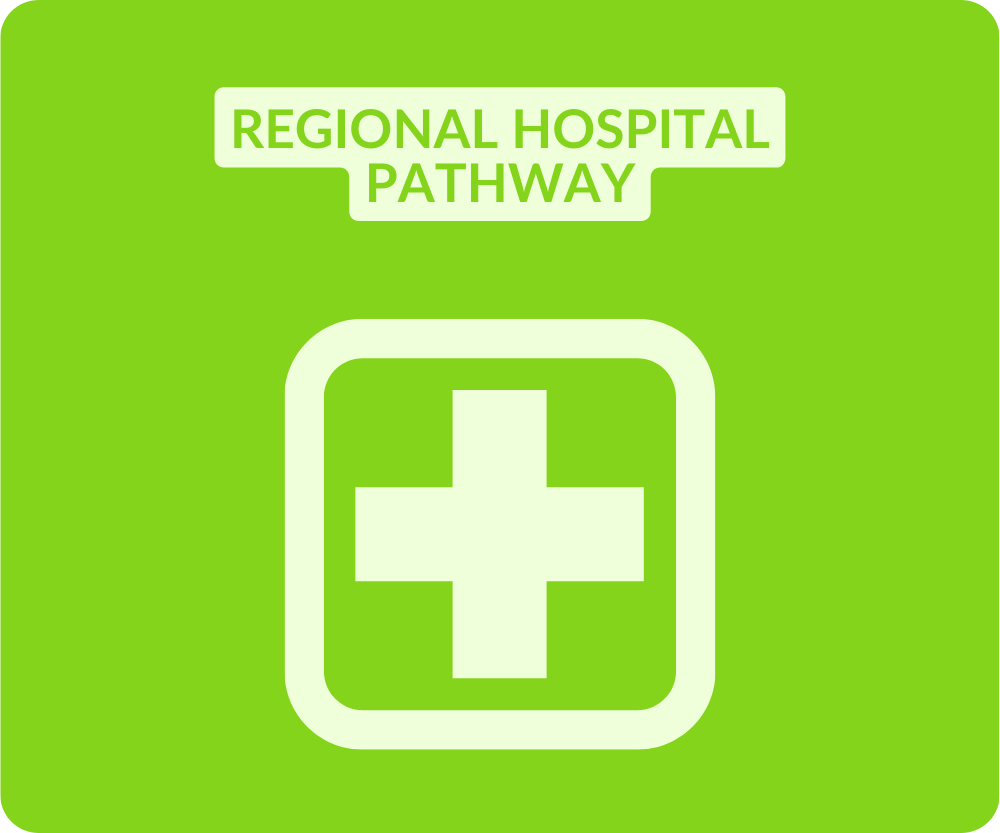

The Regional Hospital Pathway provides health professionals in a regional hospital setting with the ability to book direct specialist appointments for recently discharged patients where specialist access is otherwise limited.
For GPs/nurses/allied health professionals in regional Victoria, please see our Primary & Community Care Pathway.
Note: This service is only available in regional Victoria. If you are a health professional in a metropolitan hospital, please refer to your nearest outpatient service.
Please select one of the following options to continue:
Adult Specialties
Advance Care Planning
- Information about Advance Care Planning and how to navigate the process
- Advice for the MTDM regarding the person who lacks capacity to complete an Advanced Care Directive
- Goals of care discussions
- Conflict in decision-making
Cardiology
Continence
- Urinary / faecal incontinence
Note: This is a nurse-led clinic.
Dermatology
- Psoriasis
- Eczema
- Acne
- Rosacea
- Rash (photos required)
- Hidradenitis suppurativa
- Hives / urticaria
- Scabies
- Fungal skin infections
Endocrinology
General (Non-Diabetes)
- Thyroid disorders
- Thyroid cancer
- Calcium disorders
- Hypertension investigations
- Prolactin disorders
- Osteoporosis
- Sex hormones
- Obesity
Diabetes
- Type 1 diabetes
- Type 2 diabetes not responding to medical management (e.g has tried at least 3 glucose-lowering medicines) with HbA1c >8%
- Type 2 diabetes with complications (e.g. cardiovascular disease, kidney disease, retinopathy, cerebral vascular disease, neuropathy)
- Management of unstable glycaemia due to use of medicines that impact on glycaemic control (e.g. corticosteroids, chemotherapy protocols)
- Diagnosis of diabetes
Gastroenterology
- Liver problems – Hep B, deranged LFTs, autoimmune hepatitis, fatty liver, alcoholic liver disease (excluding newly diagnosed / decompensated cirrhosis)
- Gastro problems – altered bowel habits, abdominal pain/bloating, rectal bleeding, iron deficiency
General Medicine
- Hypertension management – medication review, lifestyle optimisation, monitoring guidance.
- Healthy ageing & lifestyle advice – preventive strategies, exercise, diet, and risk reduction.
- Medication reviews & deprescribing – polypharmacy assessment, side effects, rationalising treatments.
- Cognitive concerns (initial triage) – early screening for memory issues, basic functional assessment, referral guidance.
- Peripheral oedema assessment – venous oedema, lymphoedema, lipoedema.
- Specialist triage & advice:
- Guidance on referral pathways for complex conditions.
- Interpreting mildly abnormal tests.
- Preoperative risk assessment (low-risk procedures only)
Geriatrics
- Falls
- Polypharmacy
- Bone health
- Cognition/memory, continence
- Review of chronic disease (e.g. dementia, heart failure, respiratory disease, hypertension, diabetes, Parkinson’s disease, behavioural and psychological symptoms of dementia (BPSD)
- Optimising healthy ageing
Haematology
General
- Investigation of FBE abnormalities (e.g. neutropenia, anaemia, etc.)
- Interpretation of iron studies
- Interpretation of specialised haematology tests (e.g. protein electrophoresis, flow cytometry, free light chain assay)
Thrombosis
- Venous thrombosis
- Anticoagulation advice
- Bleeding disorder
Infectious Diseases
- General infectious diseases
- Tuberculosis
- HIV and sexual health
- Fever of unknown origin
- Hepatitis B
Musculoskeletal Physiotherapy
- Back pain & neck complaints including
- Simple back pain
- Sciatica
- Degenerative disc disease/Spondylosis
- Spondylolistheses
- Radiculopathy
- Soft tissue injuries including
- Shoulder: Post-dislocation, ACJ injuries, impingement, tendinopathy, bursitis
- Elbow: Sprain/strains, radial head fractures
- Wrist and hand injuries
- Hip pain, impingement, OA, tendinopathy, GTPS
- Knee pain, ligamentous injuries, bursitis
- Ankle & foot pain, soft tissues injuries, base 5th MT fracture
EXCLUSION CRITERIA
- Patients under the age of 16
- Workcover or TAC patients
- RACF patients
- Elderly patients with frequent falls, or falls as a primary concern (consider falls & balance clinics)
- Back pain with significant (Gd 3/5 power, of under) motor weakness or foot drop
- Cauda equina syndrome
- Back pain with new bladder/bowel dysfunction, saddle sensory change, bilateral lower limb motor or sensory disturbance
- Spinal Fracture
- Possible spinal infection (discitis/osteomyelitis, abscess)
Nephrology
- Chronic kidney disease
- Kidney impairment for investigation
- Haematuria
- Proteinuria
- Recurrent kidney stones
Neurology
General
- Migraine and tension-type headaches
- Restless legs syndrome
- Diabetic or idiopathic neuropathy
- Functional Neurological Disorders (FND)
- MRI Brain abnormalities – follow up for incidental or significant findings requiring further review.
Epilepsy
- Migraine
- Stroke
- Post-concussion syndrome
- First seizure patients
Palliative Care
- Specialist palliative care with a life-limiting condition
Rheumatology
TBA
Sexual Health
Wound
- Pressure ulcers
- Diabetic foot wounds
- Arterial ulcers
- Venous ulcers
- Slow healing acute wounds
- Wounds secondary to lymphoedema
- Burns
- Skin tears
Paediatric Specialties
Allergy
- Allergic Rhinitis
- Non IGE Mediated allergic reactions (e.g. dairy proctocolitis, FPIES)
- Food contact reactions
- Acute/chronic urticaria
- Advice regarding eczema and concern about food allergy
- Localised reactions to insect stings
- Simple drug allergy (excluding drug anaphylaxis or complex cases)
- Simple IGE-mediated food allergy for patients living remotely
Asthma
- Education
- Management
- Guidelines
Note: This is a nurse-led clinic. For diagnosis / medication assistance, please refer to ‘Respiratory and Sleep’ or ‘General Paediatrics’ below.
Complex Adolescent
- Mental health
- Eating disorders
- Gender care – consultation and community service navigation (no medical prescribing)
- Somatoform and functional concerns
- At-risk young people
- People in out of home care
- Drug and alcohol issues (no prescribing of methadone or similar)
Continence
- Bed wetting
- Constipation
- Toilet training resistance
Note: This is a nurse-led clinic.
Endocrinology
- Abnormal thyroid function
- Puberty concerns
- Growth concerns
- Irregular menstrual cycles
- Diabetes
General Paediatrics
- Developmental and behavioural concerns
- Growth concerns
- Asthma diagnosis
- Eczema
- Hayfever
- Constipation and incontinence
- Abnormal blood tests
- Vitamin D deficiency
- Iron deficiency
- Recurrent abdominal pain
- Infant issues
Respiratory and Sleep
- Asthma diagnosis
- Allergic rhinitis / hayfever
- Chronic cough
- Unexplained breathlessness
- Unexplained noisy breathing
- Insomnia
- Parasomnia – night terrors, sleepwalking, sleep talking, REM-related issues
- Hypersomnia
